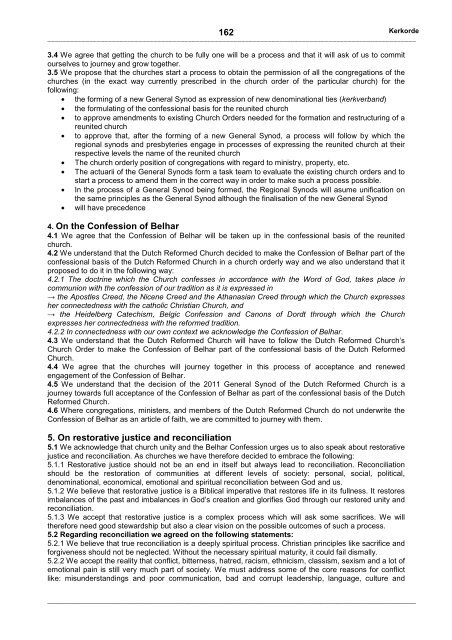Create successful ePaper yourself
Turn your PDF publications into a flip-book with our unique Google optimized e-Paper software.
162<br />
Kerkorde<br />
_________________________________________________________________________________________________<br />
3.4 We agree that getting the church to be fully one will be a process and that it will ask of us to commit<br />
ourselves to journey and grow together.<br />
3.5 We propose that the churches start a process to obtain the permission of all the congregations of the<br />
churches (in the exact way currently prescribed in the church order of the particular church) for the<br />
following:<br />
• the forming of a new General Synod as expression of new denominational ties (kerkverband)<br />
• the formulating of the confessional basis for the reunited church<br />
• to approve amendments to existing Church Orders needed for the formation and restructuring of a<br />
reunited church<br />
• to approve that, after the forming of a new General Synod, a process will follow by which the<br />
regional synods and presbyteries engage in processes of expressing the reunited church at their<br />
respective levels the name of the reunited church<br />
• The church orderly position of congregations with regard to ministry, property, etc.<br />
• The actuarii of the General Synods form a task team to evaluate the existing church orders and to<br />
start a process to amend them in the correct way in order to make such a process possible.<br />
• In the process of a General Synod being formed, the Regional Synods will asume unification on<br />
the same principles as the General Synod although the finalisation of the new General Synod<br />
• will have precedence<br />
4. On the Confession of Belhar<br />
4.1 We agree that the Confession of Belhar will be taken up in the confessional basis of the reunited<br />
church.<br />
4.2 We understand that the Dutch Reformed Church decided to make the Confession of Belhar part of the<br />
confessional basis of the Dutch Reformed Church in a church orderly way and we also understand that it<br />
proposed to do it in the following way:<br />
4.2.1 The doctrine which the Church confesses in accordance with the Word of God, takes place in<br />
communion with the confession of our tradition as it is expressed in<br />
→ the Apostles Creed, the Nicene Creed and the Athanasian Creed through which the Church expresses<br />
her connectedness with the catholic Christian Church, and<br />
→ the Heidelberg Catechism, Belgic Confession and Canons of Dordt through which the Church<br />
expresses her connectedness with the reformed tradition.<br />
4.2.2 In connectedness with our own context we acknowledge the Confession of Belhar.<br />
4.3 We understand that the Dutch Reformed Church will have to follow the Dutch Reformed Church’s<br />
Church Order to make the Confession of Belhar part of the confessional basis of the Dutch Reformed<br />
Church.<br />
4.4 We agree that the churches will journey together in this process of acceptance and renewed<br />
engagement of the Confession of Belhar.<br />
4.5 We understand that the decision of the 2011 General Synod of the Dutch Reformed Church is a<br />
journey towards full acceptance of the Confession of Belhar as part of the confessional basis of the Dutch<br />
Reformed Church.<br />
4.6 Where congregations, ministers, and members of the Dutch Reformed Church do not underwrite the<br />
Confession of Belhar as an article of faith, we are committed to journey with them.<br />
5. On restorative justice and reconciliation<br />
5.1 We acknowledge that church unity and the Belhar Confession urges us to also speak about restorative<br />
justice and reconciliation. As churches we have therefore decided to embrace the following:<br />
5.1.1 Restorative justice should not be an end in itself but always lead to reconciliation. Reconciliation<br />
should be the restoration of communities at different levels of society: personal, social, political,<br />
denominational, economical, emotional and spiritual reconciliation between God and us.<br />
5.1.2 We believe that restorative justice is a Biblical imperative that restores life in its fullness. It restores<br />
imbalances of the past and imbalances in God’s creation and glorifies God through our restored unity and<br />
reconciliation.<br />
5.1.3 We accept that restorative justice is a complex process which will ask some sacrifices. We will<br />
therefore need good stewardship but also a clear vision on the possible outcomes of such a process.<br />
5.2 Regarding reconciliation we agreed on the following statements:<br />
5.2.1 We believe that true reconciliation is a deeply spiritual process. Christian principles like sacrifice and<br />
forgiveness should not be neglected. Without the necessary spiritual maturity, it could fail dismally.<br />
5.2.2 We accept the reality that conflict, bitterness, hatred, racism, ethnicism, classism, sexism and a lot of<br />
emotional pain is still very much part of society. We must address some of the core reasons for conflict<br />
like: misunderstandings and poor communication, bad and corrupt leadership, language, culture and<br />
_________________________________________________________________________________________________


